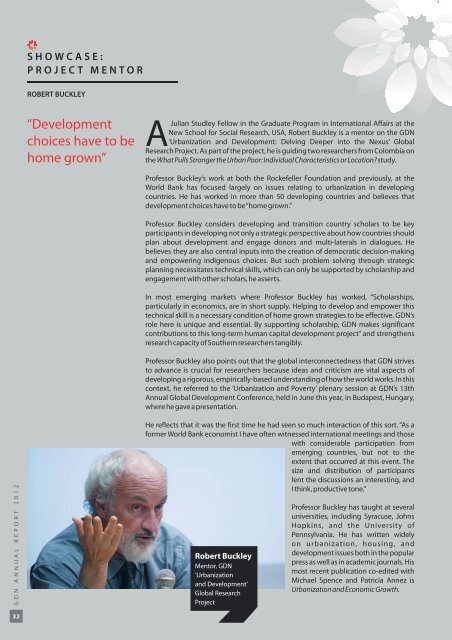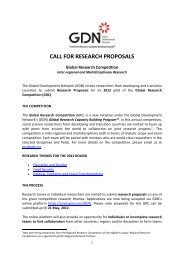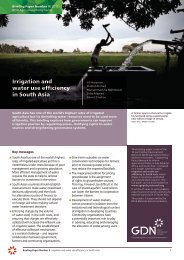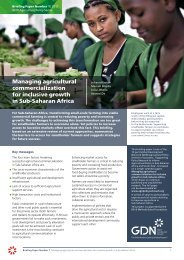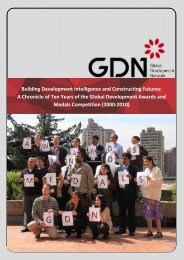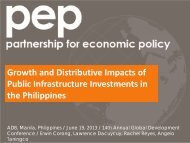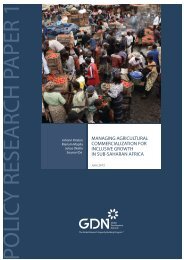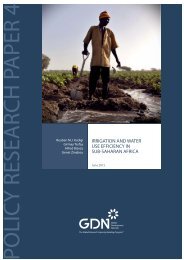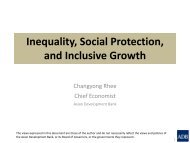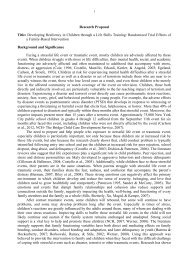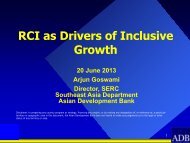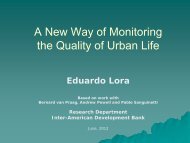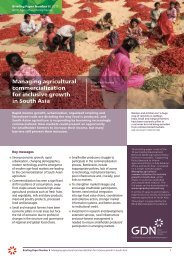ANNUAL REPORT - Global Development Network
ANNUAL REPORT - Global Development Network
ANNUAL REPORT - Global Development Network
Create successful ePaper yourself
Turn your PDF publications into a flip-book with our unique Google optimized e-Paper software.
SHOWCASE:<br />
PROJECT MENTOR<br />
ROBERT BUCKLEY<br />
“<strong>Development</strong><br />
choices have to be<br />
home grown”<br />
AJulian Studley Fellow in the Graduate Program in International Affairs at the<br />
New School for Social Research, USA, Robert Buckley is a mentor on the GDN<br />
‘Urbanization and <strong>Development</strong>: Delving Deeper into the Nexus’ <strong>Global</strong><br />
Research Project. As part of the project, he is guiding two researchers from Colombia on<br />
the What Pulls Stronger the Urban Poor: Individual Characteristics or Location study.<br />
Professor Buckley’s work at both the Rockefeller Foundation and previously, at the<br />
World Bank has focused largely on issues relating to urbanization in developing<br />
countries. He has worked in more than 50 developing countries and believes that<br />
development choices have to be“home grown.”<br />
Professor Buckley considers developing and transition country scholars to be key<br />
participants in developing not only a strategic perspective about how countries should<br />
plan about development and engage donors and multi-laterals in dialogues. He<br />
believes they are also central inputs into the creation of democratic decision-making<br />
and empowering indigenous choices. But such problem solving through strategic<br />
planning necessitates technical skills, which can only be supported by scholarship and<br />
engagement with other scholars, he asserts.<br />
In most emerging markets where Professor Buckley has worked, “Scholarships,<br />
particularly in economics, are in short supply. Helping to develop and empower this<br />
technical skill is a necessary condition of home grown strategies to be effective. GDN’s<br />
role here is unique and essential. By supporting scholarship, GDN makes significant<br />
contributions to this long-term human capital development project” and strengthens<br />
research capacity of Southern researchers tangibly.<br />
Professor Buckley also points out that the global interconnectedness that GDN strives<br />
to advance is crucial for researchers because ideas and criticism are vital aspects of<br />
developing a rigorous, empirically-based understanding of how the world works. In this<br />
context, he referred to the ‘Urbanization and Poverty’ plenary session at GDN’s 13th<br />
Annual <strong>Global</strong> <strong>Development</strong> Conference, held in June this year, in Budapest, Hungary,<br />
where he gave a presentation.<br />
GDN <strong>ANNUAL</strong> <strong>REPORT</strong> 2012<br />
He reflects that it was the first time he had seen so much interaction of this sort. “As a<br />
former World Bank economist I have often witnessed international meetings and those<br />
with considerable participation from<br />
emerging countries, but not to the<br />
extent that occurred at this event. The<br />
size and distribution of participants<br />
lent the discussions an interesting, and<br />
I think, productive tone.”<br />
Robert Buckley<br />
Mentor, GDN<br />
‘Urbanization<br />
and <strong>Development</strong>’<br />
<strong>Global</strong> Research<br />
Project<br />
Professor Buckley has taught at several<br />
universities, including Syracuse, Johns<br />
Hopkins, and the University of<br />
Pennsylvania. He has written widely<br />
on urbanization, housing, and<br />
development issues both in the popular<br />
press as well as in academic journals. His<br />
most recent publication co-edited with<br />
Michael Spence and Patricia Annez is<br />
Urbanization and Economic Growth.<br />
32


